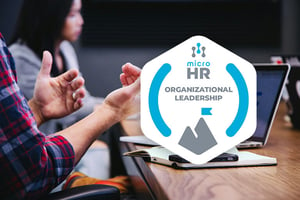A recent study by Paycor revealed a startling trend in the human resources field: nearly half of HR...
Securing a Seat at the Table: HR Must Master Business Concepts to be Viewed as a Strategic Partner

Securing a Seat at the Table: HR Must Master Business Concepts to be Viewed as a Strategic Partner
HR professionals should have a comprehensive understanding of the following business concepts:
- Strategic Planning
- Understanding Business Goals: HR professionals need to align HR strategies with the overall business objectives. Knowledge of the company's goals will help HR develop initiatives that support business growth and competitiveness.
- Long-term Planning: Strategic HR planning involves workforce planning, talent management, and succession planning, all of which require an understanding of the business's needs.
Related Micro HR Digital Badges: Business Management, Strategic HR Management, Employment, Talent & Performance Management
- Financial Acumen
- Budget Management: HR often manages significant budgets for recruitment, training, compensation, and benefits. Understanding financial principles will help in making cost-effective decisions and justifying HR expenditures.
- Compensation and Benefits: Designing competitive compensation packages requires knowledge of financial constraints and market trends.
Related Micro HR Digital Badges: Management and Finances, Strategic HR Management, Employee Compensation, Employee Benefits
- Operations Management
- Workflow and Productivity: Understanding business operations helps HR develop policies and practices that enhance productivity and efficiency.
- Process Improvement: HR can contribute to operational improvements by addressing employee performance issues and optimizing workforce deployment.
Related Micro HR Digital Badges: Talent & Performance Management, Training & Development Organizational Learning, Project Management
- Marketing and Branding
- Employer Branding: HR professionals need to market the organization as an employer of choice so they can attract and retain top talent.
- Internal Communication: Effective communication strategies enhance employee engagement and align the workforce with the company's mission, vision, and goals.
Related Micro HR Digital Badges: Employment, Organizational Communication, Strategic HR Management
- Legal and Compliance
- Regulatory Knowledge: Staying informed about labor laws, health and safety regulations, and industry-specific compliance requirements is crucial to avoid legal pitfalls and protect the organization from potential liabilities.
- Ethics and Governance: HR plays a key role in promoting ethical practices and ensuring corporate governance standards are met.
Related Micro HR Digital Badges: Employment, Employee Compensation, Employee Benefits, Risk Management, Organizational Ethics, Strategic HR Management
- Technology and Data Analytics
- HR Tech Tools: Familiarity with HR Information Systems (HRIS), Applicant Tracking Systems (ATS), and other HR tech tools enhances efficiency and decision-making.
- Data-Driven Decision Making: Utilizing data analytics helps HR professionals make informed decisions regarding hiring, performance management, and employee retention.
Related Micro HR Digital Badges: Strategic HR Management, Organizational Leadership
- Change Management
- Managing Change: HR often leads change initiatives, such as organizational restructuring or cultural transformation. Understanding change management principles is essential to smoothly guide employees through transitions.
- Adapting to Market Changes: Awareness of market trends and business dynamics will help HR anticipate and respond to changes that impact the current and future workforce.
Related Micro HR Digital Badges: Organizational Theory & Design, Organizational Change
- Leadership and Development
- Talent Development: Developing leaders within the organization requires an understanding of the skills and competencies needed to drive the business forward.
- Coaching and Mentoring: HR professionals often coach and mentor managers and employees, helping them with leadership and personal development strategies.
Related Micro HR Digital Badges: Organizational Leadership, Talent & Performance Management, Training & Development, Organizational Learning
- Customer Focus
- Understanding Customer Needs: HR can better align employee roles and training programs with the goal of meeting customer expectations and improving service delivery.
- Customer Service Culture: Promoting a customer-centric culture within the organization enhances overall performance and satisfaction.
Related Micro HR Digital Badges: Business Management, Training & Development, Organizational Learning
- Global Business Acumen
- Global Workforce Management: In multinational organizations, HR needs to manage diverse and geographically dispersed teams, requiring an understanding of global business practices and cultural differences.
- International Compliance: Staying compliant with international labor laws and practices is crucial for global operations.
Related Micro HR Digital Badges: Strategic HR Management, Global Communication
Conclusion
A thorough understanding of these business concepts enables HR professionals to contribute more effectively to the organization's success. It positions HR as a strategic partner in driving business outcomes, fostering a productive and engaged workforce, and ensuring compliance and ethical practices


